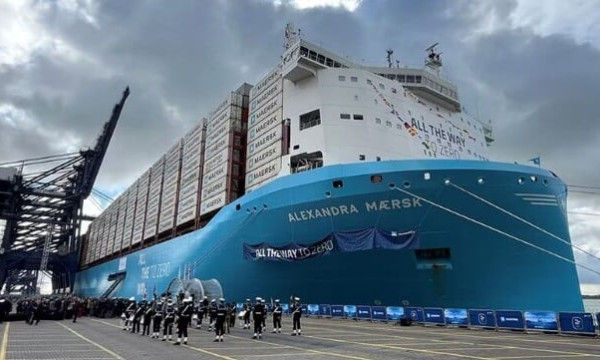Alexandra Maersk Named as Maersk's Fifth Large Methanol Containership

A.P. Moller - Maersk celebrated the naming of its latest dual-fuel methanol container vessel Alexandra Maersk today at the Port in Felixstowe, England. The 16,000 TEU vessel is the fifth in the series as the company has moved forward with its large dual-dual methanol ships and the sixth overall introduced to the Maersk fleet in the past 13 months.
"It's a privilege to join the naming ceremony for the Alexandra Maersk - one of the first container vessels to run on green methanol," said Mike Kane the UK's Maritime Minister during today's naming ceremony. "This is exactly the kind of innovation we need to deliver a greener, cleaner maritime sector which is better for people and for our planet."
Alexandra Maersk joins her sisterships Ane Maersk which was the first of the class which was named in January in Korea where they are being built. Astrid Maersk followed in April and in August the company named both Antonia Maersk and Alette Maersk. Following the tradition of naming Maersk vessels after members of the founding family, "Alexandra Maersk" is named after Alexandra Mærsk-Møller (1868-1953) who was an older sister of Mr. A.P. Møller, the founder of A.P. Moller - Maersk.
The methanol vessels are powered by MAN dual-fuel engines (Maersk)
The new methanol-enabled ships the company highlights are at the core of Maersk's ambitious decarbonization plans as low-emission methanol can reduce greenhouse gas (GHG) emissions by 65 to 90 percent compared to conventional fossil fuels such as bunker oil. The exact results depend on the feedstock and production process of the methanol, calculated on a life cycle basis. The company also continues to face challenges in building the supply of methanol to fuel the growing fleet.
The new ships are part of the first trance of methanol vessels the company ordered built by HD Hyundai in South Korea. A total of 12 vessels each with 16,000 TEU capacity were ordered and the order was later expanded with six additional vessels with a capacity of 17,000 TEU. Maersk also ordered six smaller 9,000 TEU dual-fuel methanol vessels.
The vessels are also contributing to the development of methanol bunkering. Last month, for example, Alette Maersk called at the Port of Yokohama and participated in Japan's first methanol bunkering simulation. Japan is currently in the process of developing methanol fuel bunkering guidelines. The demonstration was conducted with Kokuka Sangyo's methanol tanker, Eikamaru, and the companies said it involved collaboration to test key operations, including berthing, unberthing, and hose connections.
Maersk continues to place a high priority on methanol-fueled vessels although they said the current fleet renewal program would use a variety of fuel types, Maersk cited delays and costs in building the methanol supply. Maersk reported it had also commenced the work of securing offtake agreements for liquified bio-methane (bio-LNG) to ensure that its new dual-fuel gas vessels provide greenhouse gas emissions reductions in this decade.